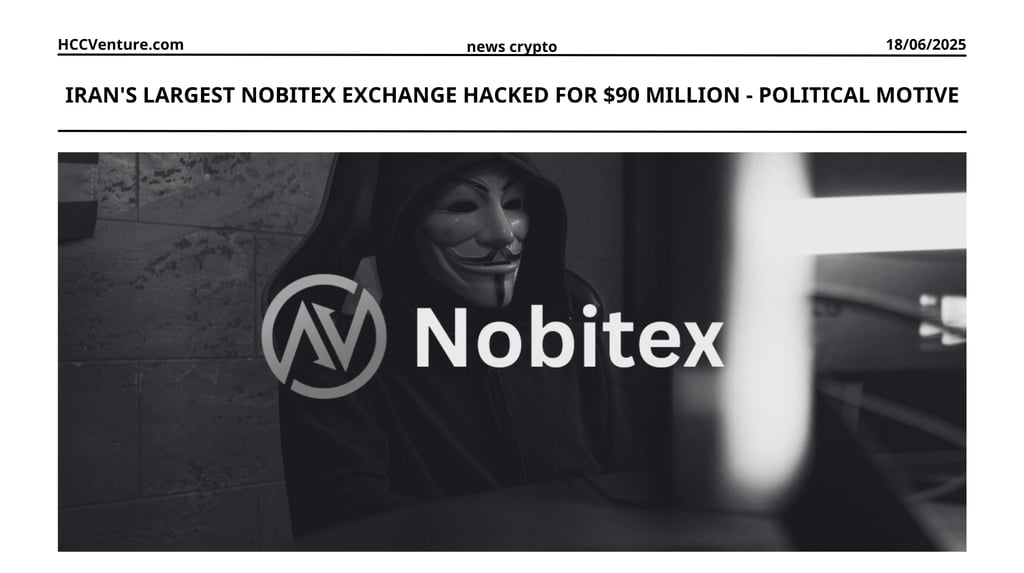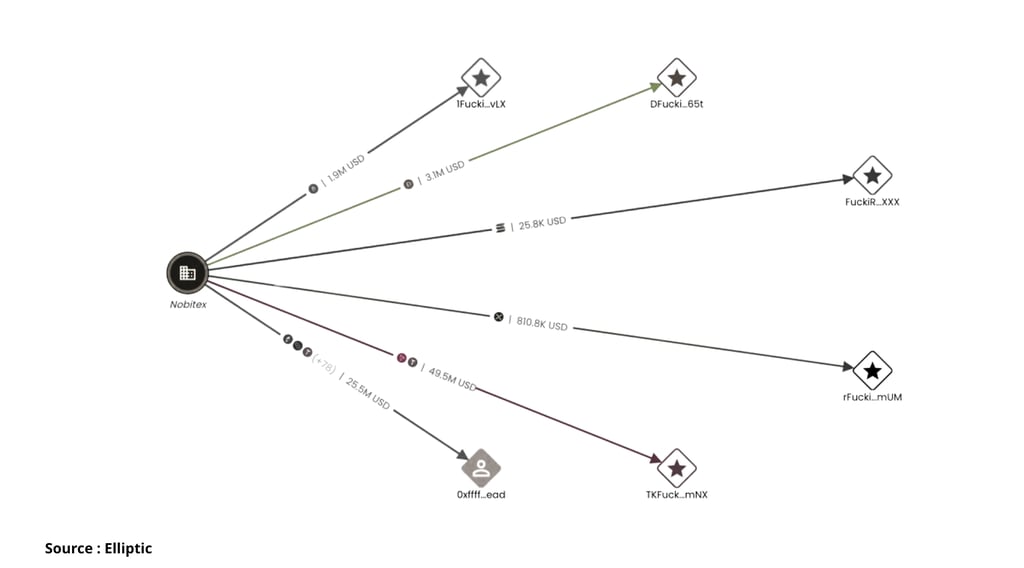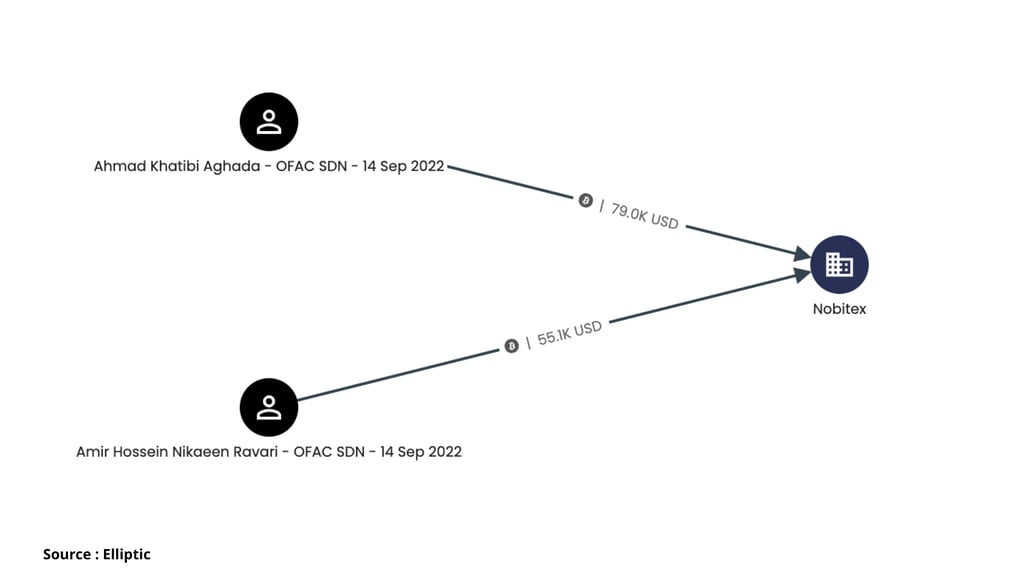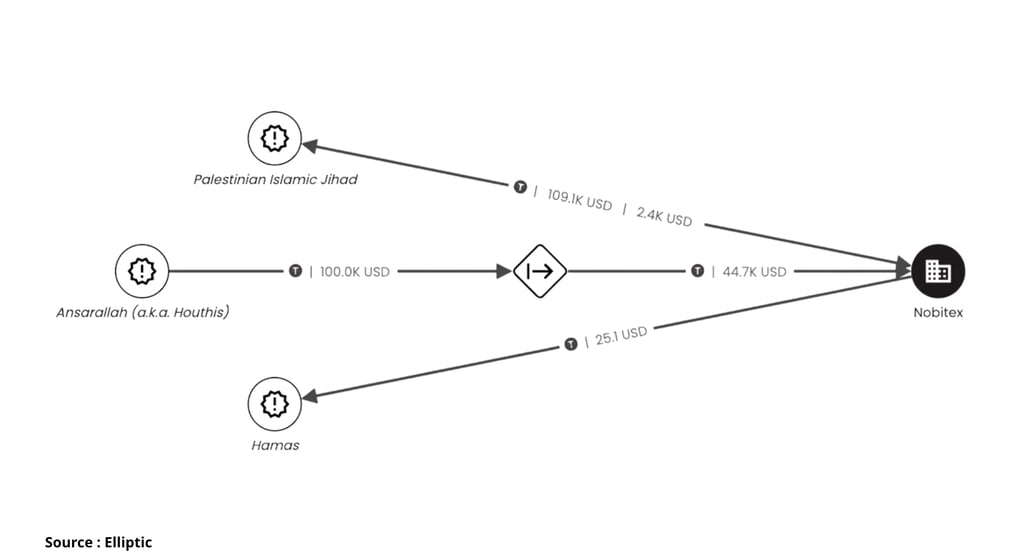Iran's largest exchange Nobitex hacked for nearly $90 million - political motive
Nobitex, which made headlines when it was hacked, caused an estimated loss of at least $81.7 million. The incident not only shocked the cryptocurrency market but also sparked debate about the political motives behind it, especially amid escalating tensions between Iran and Israel.
6/18/20254 min read


Hack context and geopolitical implications
Nobitex, Iran’s leading cryptocurrency exchange, has long been a key player in helping Iranians trade and store digital assets, especially amid international economic sanctions that limit access to the traditional financial system. The hack was allegedly carried out by an Israeli-linked hacker group calling itself “Predatory Sparrow,” who publicly claimed responsibility and threatened to release Nobitex’s source code and sensitive information if their demands were not met.
Notably, the motive for the hack appears to be more than just financial assets. Statements from the hackers indicate that they targeted Nobitex’s role in helping the Iranian regime circumvent international sanctions and fund alleged terrorist activities. This raises the possibility that the attack was not simply a routine cybercrime, but rather part of a geopolitical strategy to put pressure on Iran amid its escalating conflict with Israel.
Political Signs in the Attack
While there is no concrete evidence that the Predatory Sparrow group itself moved the funds, technical indicators and the backdrop of political tensions between Iran and Israel suggest that it was a politically motivated act. In particular, many of the wallet addresses that received the stolen funds bore unique vanity names with phrases like “F*ckIRGCterrorists”—a reference to Iran’s Islamic Revolutionary Guard Corps (IRGC).


According to Elliptic, these addresses were brute-forced to contain custom strings of characters – something that would be nearly impossible to do at such length without a clear purpose. This makes it likely that the attacker did not have access to the private keys of these wallets, meaning the funds were “burned” permanently to send a symbolic message.
The connection between Nobitex and IRGC
As Iran’s largest cryptocurrency exchange with over 7 million users, Nobitex has been linked to high-ranking figures in the government and the IRGC. Several open-source investigations have revealed ties between Nobitex and close associates of Iran’s Supreme Leader Ali Khamenei, as well as individuals and organizations associated with the IRGC.


Elliptic also found that Nobitex was the destination of funds from two US-sanctioned individuals – Ahmad Khatibi Aghada and Amir Hossein Niakeen Ravari – who are accused of involvement in ransomware and critical infrastructure attacks. They are believed to be linked to the technology company Afkar System Yazd , which is a malware vendor run by Khatibi.
The US Treasury Department said these individuals exploited security vulnerabilities to infiltrate global systems to conduct malicious activities, including ransom demands.


The economic role of the IRGC
The IRGC is a powerful military force that reports directly to Iran’s Supreme Leader, and has significant influence over many sectors of the country’s economy, especially the oil and gas industry. This allows it to bypass international sanctions and provide financial support to militant groups operating outside Iran’s borders.
Elliptic's blockchain analysis also revealed related transactions between Nobitex and the digital wallets of organizations such as Hamas, Palestinian Islamic Jihad and Houthi rebels – groups listed as terrorist organizations by many Western countries.
Sanctions monitoring and compliance
The Elliptic Analytics team is committed to continuously updating its system that tracks Iran-related cryptocurrency transactions, ensuring that financial institutions and individuals using its services can fully comply with international sanctions.
Elliptic recommends that stakeholders use their blockchain monitoring toolkit to proactively hedge against financial and legal risks arising from transactions involving sanctioned entities.
Conclusion and recommendations
The Nobitex hack is a stark reminder of the intersection of cryptocurrencies, cybersecurity, and geopolitics. For exchanges, beefing up security, especially with hot wallets and authentication protocols, is imperative to prevent similar attacks. Users should consider using cold wallets and self-custody solutions to mitigate risk. On the market front, investors should brace for short-term volatility due to the psychological impact of the hack, while closely monitoring geopolitical developments in the Middle East.
From a geopolitical perspective, this incident shows that cryptocurrencies are not only a financial tool but also a new battlefield in modern conflicts. Countries and organizations need to build stronger regulations and protections to ensure the safety of the cryptocurrency ecosystem and minimize the risk of being exploited for political purposes. The Nobitex hack is not only a financial event but also a reminder of the complexity of the digital world in the context of globalization and conflict.
Disclaimer: The information presented in this article is the author's personal opinion on the cryptocurrency field. It is not intended to be financial or investment advice. Any investment decision should be based on careful consideration of your personal portfolio and risk tolerance. The views expressed in the article do not represent the official position of the platform. We recommend that readers conduct their own research and consult with a professional before making any investment decisions.
Compiled and analyzed by HCCVenture
Join HCCVenture here: https://linktr.ee/holdcoincventure
Explore HCCVenture group
HCCVenture © 2023. All rights reserved.

Connect with us
Popular content
Contact to us
E-mail : sp_contact@hccventure.com
Register : https://linktr.ee/holdcoincventure
Disclaimer: The information on this website is for informational purposes only and should not be considered investment advice. We are not responsible for any risks or losses arising from investment decisions based on the content here.


TERMS AND CONDITIONS • CUSTOMER PROTECTION POLICY
ANALYTICAL AND NEWS CONTENT IS COMPILED AND PROVIDED BY EXPERTS IN THE FIELD OF DIGITAL FINANCE AND BLOCKCHAIN BELONGING TO HCCVENTURE ORGANIZATION, INCLUDING OWNERSHIP OF THE CONTENT.
RESPONSIBLE FOR MANAGING ALL CONTENT AND ANALYSIS: HCCVENTURE FOUNDER - TRUONG MINH HUY
Read warnings about scams and phishing emails — REPORT A PROBLEM WITH OUR SITE.
